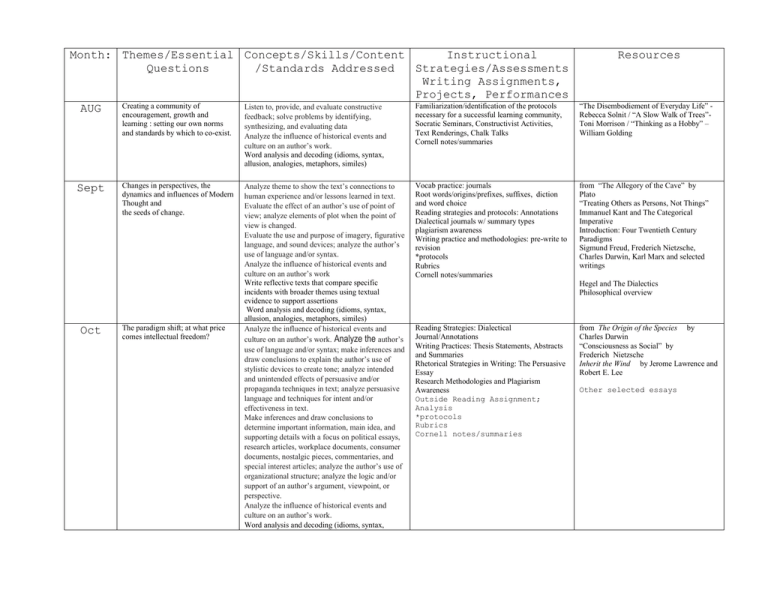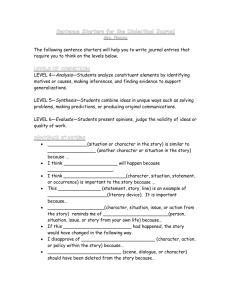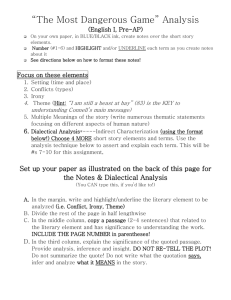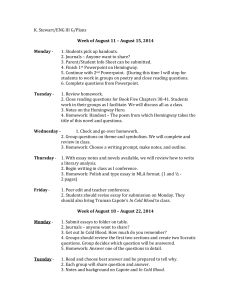“A Clean Well-Lighted Place” Ernest Hemingway
advertisement

Month: Themes/Essential Concepts/Skills/Content Instructional Questions /Standards Addressed Strategies/Assessments Writing Assignments, Projects, Performances Creating a community of Familiarization/identification of the protocols Listen to, provide, and evaluate constructive AUG Sept Oct encouragement, growth and learning : setting our own norms and standards by which to co-exist. feedback; solve problems by identifying, synthesizing, and evaluating data Analyze the influence of historical events and culture on an author’s work. Word analysis and decoding (idioms, syntax, allusion, analogies, metaphors, similes) necessary for a successful learning community, Socratic Seminars, Constructivist Activities, Text Renderings, Chalk Talks Cornell notes/summaries Changes in perspectives, the dynamics and influences of Modern Thought and the seeds of change. Analyze theme to show the text’s connections to human experience and/or lessons learned in text. Evaluate the effect of an author’s use of point of view; analyze elements of plot when the point of view is changed. Evaluate the use and purpose of imagery, figurative language, and sound devices; analyze the author’s use of language and/or syntax. Analyze the influence of historical events and culture on an author’s work Write reflective texts that compare specific incidents with broader themes using textual evidence to support assertions Word analysis and decoding (idioms, syntax, allusion, analogies, metaphors, similes) Analyze the influence of historical events and culture on an author’s work. Analyze the author’s use of language and/or syntax; make inferences and draw conclusions to explain the author’s use of stylistic devices to create tone; analyze intended and unintended effects of persuasive and/or propaganda techniques in text; analyze persuasive language and techniques for intent and/or effectiveness in text. Make inferences and draw conclusions to determine important information, main idea, and supporting details with a focus on political essays, research articles, workplace documents, consumer documents, nostalgic pieces, commentaries, and special interest articles; analyze the author’s use of organizational structure; analyze the logic and/or support of an author’s argument, viewpoint, or perspective. Analyze the influence of historical events and culture on an author’s work. Word analysis and decoding (idioms, syntax, Vocab practice: journals Root words/origins/prefixes, suffixes, diction and word choice Reading strategies and protocols: Annotations Dialectical journals w/ summary types plagiarism awareness Writing practice and methodologies: pre-write to revision *protocols Rubrics Cornell notes/summaries The paradigm shift; at what price comes intellectual freedom? Resources “The Disembodiement of Everyday Life” Rebecca Solnit / “A Slow Walk of Trees”Toni Morrison / “Thinking as a Hobby” – William Golding from “The Allegory of the Cave” by Plato “Treating Others as Persons, Not Things” Immanuel Kant and The Categorical Imperative Introduction: Four Twentieth Century Paradigms Sigmund Freud, Frederich Nietzsche, Charles Darwin, Karl Marx and selected writings Hegel and The Dialectics Philosophical overview Reading Strategies: Dialectical Journal/Annotations Writing Practices: Thesis Statements, Abstracts and Summaries Rhetorical Strategies in Writing: The Persuasive Essay Research Methodologies and Plagiarism Awareness Outside Reading Assignment; Analysis *protocols Rubrics Cornell notes/summaries from The Origin of the Species by Charles Darwin “Consciousness as Social” by Frederich Nietzsche Inherit the Wind by Jerome Lawrence and Robert E. Lee Other selected essays allusion, analogies, metaphors, similes) Nov War and Remembrance: The Rise of Realism and Descent into Naturalism: World War I, World War II and the Cold War The Vietnam War Literature as Social commentary Dec War and Remembrance: The Rise of Realism and Descent into Naturalism: World War I, World War II and the Cold War The Vietnam War Literature as Social Commentary Analyze the author’s use of language and/or syntax; make inferences and draw conclusions to explain the author’s use of stylistic devices to create tone; analyze intended and unintended effects of persuasive and/or propaganda techniques in text; analyze persuasive language and techniques for intent and/or effectiveness in text. Analyze the influence of historical events and culture on an author’s work. Word analysis and decoding Vocab practice: journals Root words/origins/prefixes, suffixes, diction and word choice Reading strategies and skills Annotations Dialectical journals w/ summary types Timed writing response/essay questions *protocols Socratic seminars Outside reading project/presentation Group discussion Cooperative group activities discussion/literature circles All Quiet on the Western Front; Erich Maria Remarque “In Another Country”, & “A Natural History of the Dead”; Ernest Hemingway From “The Waste land”; T.S. Eliot Catch-22; Joseph Heller from Children in the Holocaust and World War II: Their Secret Diaries & Night; Elie Wiesel The Things They Carried; Tim O’Brien From Slaughterhouse Five; Kurt Vonnegut Write expository texts using organizational structures, relevant evidence, and stylistic devices appropriate to audience and purpose. Write narrative/descriptive compositions that demonstrate control of a range of strategies to achieve purpose. Write literary analysis based on critical stances supported by the text and/or a variety of sources. Analyze the influence of historical events and culture on an author’s work. Make inferences and draw conclusions to explain the author’s use of stylistic devices to create tone and mood, and to explain the author’s use of irony. Analyze the influence of historical events and culture on an author’s work. Analyze an author’s use and purpose of symbolism. Word analysis and decoding *Lit analysis paper; (how authors use literary devices rhetorically, aesthetically, and to elicit response) Abstracts Timed writing response/essay questions *protocols Socratic seminars Outside reading Vocab practice: journals Root words/origins/prefixes, suffixes, diction and word choice Reading strategies and skills Annotations project/presentation Group discussion Cooperative group activities discussion/literature circles All Quiet on the Western Front; Erich Maria Remarque “In Another Country”, & “A Natural History of the Dead”; Ernest Hemingway From “The Waste land”; T.S. Eliot Catch-22; Joseph Heller from Children in the Holocaust and World War II: Their Secret Diaries & Night; Elie Wiesel The Things They Carried; Tim O’Brien From Slaughterhouse Five; Kurt Vonnegut Jan Feb The Existential Introduced and the Absurd Revisted: Literature as social Commentary Reading Text as Intentional Inference Objective Truth vs. Subjective Truth Connotation vs Denotation The Fight for Dignity in the Face of Modernity Literature as Social Commentary March A Struggle for Recognition and Understanding in the Survival of the Ordinary: The Modern Dilemma Write persuasive text using rhetoric appropriate to audience and purpose that clearly states and supports a position. Write narrative/descriptive compositions that demonstrate control of a range of strategies to achieve purpose. Write literary analysis based on critical stances supported by the text and/or a variety of sources. Analyze the influence of historical events and culture on an author’s work. Organize ideas through cause and effect or comparison/contrast to enhance central theme Analyze the influence of historical events and culture on an author’s work. Read to comprehend, interpret and evaluate literature *Lit Analysis paper: (The Absurdist Hero) Timed writing response/essay questions *protocols Socratic seminars Outside reading project/presentation Vocab practice: journals Root words/origins/prefixes, suffixes, diction and word choice Reading strategies and skills Annotations Group discussion Cooperative group activities discussion/literature circles Cornell Notes/summaries Inference, conclusion, deduction, induction conclusion Rhetorical strategies/effectiveness Writing process and practices The Existential Introduced and the Absurd Revisited: from “The Myth of Sisyphus” Albert Camus The Stranger Albert Camus from “Being and Nothingness” Jean Paul Sartre Siddartha : Herman Hesse Analyze the author’s use of language and/or syntax; make inferences and draw conclusions to explain the author’s use of stylistic devices to create tone and effect Analyze the influence of historical events and culture on an author’s work. Use textual evidence to analyze theme/meaning/scope of literature Write narratives that reveal the writer’s attitude toward the subject Edit compositions for use of standard English Make supported inferences using textual eveidence Literary analysis paper: The Definitve Man, Hemingway Style Reading text as intentional: Literary Analysis: allusion, figurative language,symbolism, characterization, tone, mood, etc. Reading Strategies: Annotations/Dialectical Journals Inference, conclusion, deduction, induction conclusion connotation vs. denotation Writing process and practices Vocab journals Critical reading of text/ Literary Analysis: allusion, figurative language,symbolism, characterization, tone, mood, etc. Reading Strategies: Annotations/Dialectical Journals Inference, conclusion, deduction, induction conclusion connotation vs. denotation Research methodologies Outside reading novel project Writing process and practices Literary terms project begins Vocab journals Socratic Seminars Rubrics Protocols/Literary Circles The Old Man and The Sea Ernest Hemingway “A Clean Well-Lighted Place” Ernest Hemingway “Hills Like White Elephants” Ernest Hemingway “The Snows of Kilimanjaro” Ernest Hemingway and other selected writings A Streetcar Named Desire Tennessee Williams Death of a Salesman Arthur Miller The Ballad of the Sad Café Carson McCullers and other selected writings Unit: Themes and Month: Essential Questions April May A Study in Aesthetic Theory: Symbolism, Impressionism, Expressionism, Imagism, and Surrealism Beyond the realm of existence; Science Fiction Reflective exercises on the dilemma of man in modern times Cinema as Social commentary/Artistic Merit/Artist’s Vision Concepts/Skills/Content Assessments (Writing Assignments, Projects, Performances) Resources Write narrative/descriptive compositions that demonstrate control of a range of strategies to achieve purpose. Write literary analyses based on critical stances supported by the text and/or a variety of sources. Formulate research questions and use a research design to gather information Evaluate possible resources for credibility and usefulness cite sources of information using a standard form of documentation Justify a position by using logic and refuting opposing viewpoints Participate in discussion by evaluating, synthesizing and identifying data Reading text as intentional: Literary Analysis and evaluation / effectiveness allusion, figurative language,symbolism, characterization, tone, mood, etc. Reading Strategies: Annotations/Dialectical Journals Inference, conclusion, deduction, induction conclusion connotation vs. denotation Research methodologies Outside reading novel project Writing process and practices Literary terms project continues Vocab journals Socratic Seminars Rubrics Protocols/Literary Circles “The Metamorphosis” Franz Kafka Write narrative/descriptive compositions that demonstrate control of a range of strategies to achieve purpose. Write literary analyses based on critical stances supported by the text and/or a variety of sources. Formulate research questions and use a research design to gather information Evaluate possible resources for credibility and usefulness cite sources of information using a standard form of documentation Justify a position by using logic and refuting opposing viewpoints Participate in discussion by evaluating, synthesizing and identifying data Critical analysis of lit devices and their effectiveness Reading Strategies: Annotations/Dialectical Journals Inference, conclusion, deduction, induction conclusion connotation vs. denotation Research methodologies Outside reading novel project Writing process and practices Literary terms project continues Vocab journals Socratic Seminars Rubrics Protocols/Literary Circles 2001:A Space Odyssey Arthur C. Clarke “Revelation” Flannery O’Connor “A Good Man is Hard to Find” Flannery O’Connor “The Love Song of J. Alfred Prufrock” T.S. Eliot from “A Sheaf of Imagist Verse” Lowell, Pound, Williams and other selected writings Film Study: Stanley Kubric’s 2001:A Space Odyssey The Martian Chronicles; Ray Bradbury June Reflection of the 20th century and the quintessential dilemmas of the modern man Test taking strategies and study skills are emphasized in review for final exams All other elements/standards will be touched upon throughout the course of the year Review/Test taking strategies/protocols Preparation for final exams Writing process and practices Probing questions Summarizations/evaluations Socratic Seminars Group work/whole discussion Selected writings by class choice





